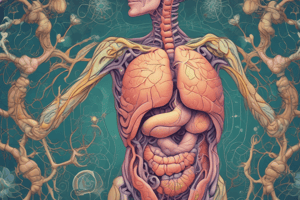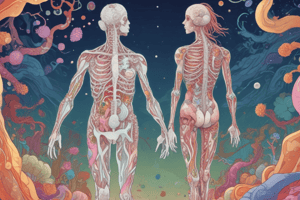Podcast
Questions and Answers
What type of cells in the gut epithelium are primarily responsible for nutrient absorption?
What type of cells in the gut epithelium are primarily responsible for nutrient absorption?
- Stem cells
- Terminally differentiated cells
- Absorptive cells (correct)
- Mucous cells
What term describes cells that cannot divide and are at the end of their developmental pathway?
What term describes cells that cannot divide and are at the end of their developmental pathway?
- Precursor cells
- Stem cells
- Progenitor cells
- Terminally differentiated cells (correct)
Which of the following statements about cancer is true?
Which of the following statements about cancer is true?
- Cancer is a major cause of death alongside several other health issues. (correct)
- Cancer is primarily caused by infectious diseases.
- Only stem cells can lead to cancer when they divide.
- Terminally differentiated cells frequently contribute to the formation of cancer.
How do tissue-specific stem cells contribute to the maintenance of tissues?
How do tissue-specific stem cells contribute to the maintenance of tissues?
What is indicated by the statement that mechanisms controlling cell proliferation and differentiation can go wrong?
What is indicated by the statement that mechanisms controlling cell proliferation and differentiation can go wrong?
In which regions is it noted that one in five people may die from cancer?
In which regions is it noted that one in five people may die from cancer?
What is a notable feature of terminally differentiated cells in the gut epithelium?
What is a notable feature of terminally differentiated cells in the gut epithelium?
What role has cancer research played in the understanding of cell and tissue biology?
What role has cancer research played in the understanding of cell and tissue biology?
What is a key characteristic of cancer cells that distinguishes them from normal cells?
What is a key characteristic of cancer cells that distinguishes them from normal cells?
What defines a malignant tumor?
What defines a malignant tumor?
Which of the following is primarily responsible for the genetic instability found in most cancer cells?
Which of the following is primarily responsible for the genetic instability found in most cancer cells?
What role does apoptosis play in normal tissues compared to tumorigenesis?
What role does apoptosis play in normal tissues compared to tumorigenesis?
What emerging hallmark of cancer involves changes in how cancer cells metabolize nutrients?
What emerging hallmark of cancer involves changes in how cancer cells metabolize nutrients?
Which statement is true regarding somatic mutations in cancer?
Which statement is true regarding somatic mutations in cancer?
What happens when a single cell undergoes a genetic alteration in the context of cancer?
What happens when a single cell undergoes a genetic alteration in the context of cancer?
What is the significance of p53 mutations in cancer development?
What is the significance of p53 mutations in cancer development?
Which process can inadvertently support cancer growth through inflammatory responses?
Which process can inadvertently support cancer growth through inflammatory responses?
How many key capabilities must malignant cancer cells acquire to survive and proliferate?
How many key capabilities must malignant cancer cells acquire to survive and proliferate?
Flashcards
Terminally Differentiated Cells
Terminally Differentiated Cells
Specialized cells that have reached the end of their development and can no longer divide, like red blood cells or skin cells.
Tissue-Specific Stem Cells
Tissue-Specific Stem Cells
Cells that can divide and produce both more stem cells and specialized cells, ensuring a continuous supply of differentiated cells.
Tissue Renewal
Tissue Renewal
The process of continuous replacement of cells in tissues, like the lining of the intestine.
Cancer
Cancer
Signup and view all the flashcards
Precursor Cells
Precursor Cells
Signup and view all the flashcards
Cell Proliferation & Differentiation
Cell Proliferation & Differentiation
Signup and view all the flashcards
Cell and Tissue Biology
Cell and Tissue Biology
Signup and view all the flashcards
Cancer Research
Cancer Research
Signup and view all the flashcards
What is a cancerous cell?
What is a cancerous cell?
Signup and view all the flashcards
What's a benign tumor?
What's a benign tumor?
Signup and view all the flashcards
What's a malignant tumor?
What's a malignant tumor?
Signup and view all the flashcards
What is a somatic mutation?
What is a somatic mutation?
Signup and view all the flashcards
What is apoptosis?
What is apoptosis?
Signup and view all the flashcards
What is cell division?
What is cell division?
Signup and view all the flashcards
What is a tumor suppressor gene?
What is a tumor suppressor gene?
Signup and view all the flashcards
What is an oncogene?
What is an oncogene?
Signup and view all the flashcards
What is genomic instability?
What is genomic instability?
Signup and view all the flashcards
What is immune surveillance?
What is immune surveillance?
Signup and view all the flashcards
Study Notes
Gut Epithelium and Cell Renewal
- Gut epithelium contains absorptive cells and mucus-producing goblet cells.
- Specialized cells like red blood cells, epidermal cells, and gut absorptive/goblet cells are terminally differentiated, meaning they cannot divide.
- Tissue-specific stem cells continuously generate terminally differentiated cells in many organs.
- During division, stem cells can remain stem cells, differentiate into precursor cells, or become terminally differentiated cells.
Cancer: Causes and Characteristics
- Cancer is a major cause of death globally, especially in Europe and North America.
- Cancer is a genetic disease stemming from pathological changes in DNA (primarily somatic mutations).
- Cancer cells have two key characteristics: uncontrolled proliferation and the ability to invade and colonize other tissues.
- A benign tumor has uncontrolled proliferation but does not invade other tissues.
- Cancer cells often have many mutations affecting cell division and programmed cell death (apoptosis).
- Genetic instability in cancer cells increases mutation rates.
- p53 mutation is common in cancers.
The Hallmarks of Cancer
- Normal cells must adapt to the needs of the organism: dividing only when needed, living or dying as needed, maintaining specialized functions, and staying in their designated area.
- A single cell with genetic alteration can cause uncontrolled proliferation and lead to cancer.
- Cancer cells require multiple mutations to develop.
- Cancer is characterized by the ability to reprogram cellular metabolism and evade immune system attack (emerging hallmarks).
- Genomic instability in cancer cells aids in tumor progression.
- Inflammation can support cancer development through the promotion of multiple hallmarks.
Studying That Suits You
Use AI to generate personalized quizzes and flashcards to suit your learning preferences.




